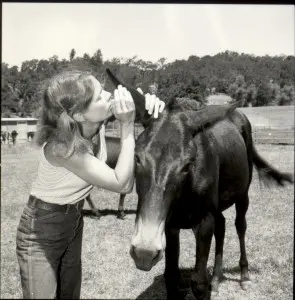Meredith on Modern Farmer
Meredith Hodges was recently interviewed by Anna Roth for Modern Farmer, a website and magazine for people interested in global agricultural issues, as part of a series of donkey-themed articles! Meredith discussed her training methods and philosophies, and specifically how they relate to—and must sometimes be altered for—donkeys.

It wouldn’t be inaccurate to call equine specialist Meredith Hodges a “donkey-whisperer,” considering that she’s spent most of her life coaxing donkeys and mules into unprecedented acts. She fought to get them incorporated into competitive equine events around the world, and is a firm believer in the animals’ intelligence, thoughtfulness and the fact that a donkey or mule can do everything just as well as a horse can.
From her Lucky Three Ranch in Colorado, she’s created a small empire of books (including the influential Training Mules and Donkeys: A Logical Approach To Longears), TV shows, charitable programs, and animal welfare and advocacy groups. Her training approach — culled from other equine experts, including Richard Shrake, as well as behavior modification techniques she learned during her time as a psychiatric technician in the ‘70s — includes patience, mutual respect and plenty of oats. It works, and now Hodges is a much sought-after sage for donkey owner woes.
Modern Farmer: How did you get started with donkey training?
Meredith Hodges: I started with my mother’s ranch out in Healdsburg. That was my introduction to mules. I found out real quick that the horsemanship training techniques that I had learned before were just too expedited and not detailed enough [for donkeys].
I thought everything that everyone else does, that [donkeys] were stubborn and don’t want to do things. It took me about three months to realize that they are just simply looking out for themselves. They have a very high sense of self-preservation. They’re extremely intelligent, sure-footed, resistant to disease and when they get into a situation, get tangled into a fence or something, they won’t thrash around but wait quietly to get themselves out of it.
Mules do exactly what you teach them. If you chase them they think they’re in a game and supposed to run away. They think it’s pretty funny. They have a tremendous sense of humor and love to humiliate human beings. We’re pretty foolish, we don’t realize we’re getting sucked into a game here.
MF: How do you get them to do the things you want them to do?
MH: I realized that every equine we were working with would respond and repeat good behaviors when they were rewarded with the oats. I used to feed the animals who go for [pasture] turnout oats in the morning, and when I turned them out for an hour they wouldn’t want to come in from the pasture. I decided to shift the oats to the evening feeding, and as long as the oats were there waiting for them they always come in to the dirt pen. I never had to chase them, it was just, here they come. I thought, there’s something to this.
Check out the full interview here.






